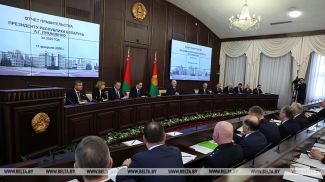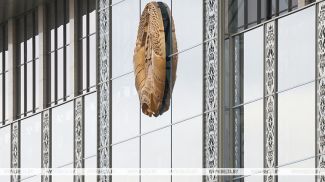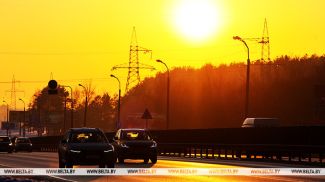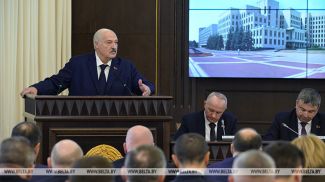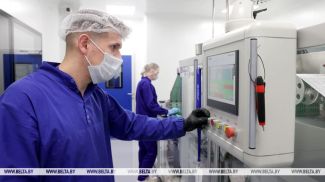MINSK, 11 January (BelTA) – Belarus President Aleksandr Lukashenko gave an interview to a well-known Russian journalist, interviewer Nailya Asker-Zade. It was aired on the Rossiya 1 TV channel on 10 January, BelTA has learned.
Although interviews with the Belarusian head of state are always interesting and resonating, this one was unusual for its format: Aleksandr Lukashenko answered questions while driving a car, on an ice rink, in the Palace of Independence, over hot pancakes in the home environment... Therefore, the conversation turned out not only emotional but also very wide-ranging. A bonus to it was an interview with Nikolai, Aleksandr Lukashenko's youngest son. By the way, in her social media account the journalist described the young man as an unspoilt, humble, thinking person. However, first things first.
Behind the wheel from the 8th grade
The conversation began in a car that Aleksandr Lukashenko was driving. “Shall we? You are not afraid, are you?” the head of state asked.
“Well, of course I am not. No president has ever taken me for a ride. Moreover, you are an experienced driver!” the journalist replied.
The president said that he drives a car regularly, including to his workout sessions. “I joke sometimes that I was born in a vehicle. My first driving experience was a tractor. An MTZ-50,” he said.
Aleksandr Lukashenko admitted that he has been driving a vehicle from the 8th grade, he drove a tractor first, then a GAZ-51. Thus, Aleksandr Lukashenko's driving experience is about twice as much as the presidential one.
President's work schedule is a hamster wheel
Asked if he was tired of being the country's leader, Aleksandr Lukashenko replied: “The man gets used to everything. The president's work schedule is like a hamster wheel. It's impossible to stop. The wheel is spinning. So are you. Probably, as people say, you won't try, you won't fall. This is why you get used to it, and you don't get the feeling ‘Oh, I'm so tired, I quit...' This might be true if you think about it. But you don't think about it.”
The head of state said that he does not like business trips, especially long-haul flights, as it is tiring. On the other hand, it is a huge experience for his youngest son Nikolai, the president noted. “He saw this job in all its manifestations,” Aleksandr Lukashenko said.
Nailya Asker-Zade asked whether Aleksandr Lukashenko likes being called Batka. “But I am a father. Like it or not, I am. I got used to it,” the president replied.
President's working day has no start and no end
“It is really so, I'm not kidding. Sometimes you have to work round the clock in very intense periods (to be honest, there are not so many of them in the presidential life),” Aleksandr Lukashenko said.
“What about this year?” Nailya Asker-Zade asked.
“You know that we had protesters walking on the streets on weekends, so there were no days off, speaking frankly,” the head of state said.
As for his working day, Aleksandr Lukashenko said he gets up very early. It's a habit since childhood. “Often, if I stay awake till morning, I write some notes or talking points. Well, then, if I can go back to sleep, I take a nap for an hour or 30 minutes and wake up at 6.00 or 6.30 and then I go for a workout,” the president revealed details of his schedule.
Aleksandr Lukashenko said that he works out mainly outdoors and admits that he does not like any fitness and is not a keep-fit fanatic. The Belarusian head of state said he prefers playing sports: “I have been into football since childhood. But I injured a knee joint in the 10th grade, which started to feel with age. Well, that's why I do hockey sometimes.”
Ice hockey about three times a week
Aleksandr Lukashenko invited Nailya Asker-Zade to a hockey practice that took place in the evening in the Olympik Arena in Minsk.
The head of state said that he goes out on the ice about three times a week. He held a clinic for the journalist, showed her how to wear hockey gear and throw at the net. “Oh, you are doing really great!” he exclaimed enthusiastically after Nailya's good attempt at the net.
“Do Putin and you play in the same team or different teams?” the interviewer wondered.
“We do not play in different teams. Now we also take Kolya with us. The three of us – Kolya, he and I - play together. Kolya is more involved with the skating part, and we help him,” Aleksandr Lukashenko said.
“Are you one team in politics?” the journalist continued asking.
“In politics, basically we are. We have been made to play in one team for good,” the president responded.
On friends and foes
The head of state was asked if he sees Russian President Vladimir Putin as his friend. “Yes, I think of him as a friend, and last year he proved that he was not only my friend, but also a friend of the Belarusian people. Sincere friend,” the Belarusian leader stressed.
When asked if he had other friends, Aleksandr Lukashenko said it was a difficult question. “I have been thinking about it a lot. And my conclusion is, probably, no,” he said.
“And what about foes?” Nailya Asker-Zade asked.
“I have many opponents. Time will tell if they have become my foes,” the head of state answered.
On further integration with Russia
Of course, the interviewer could not but ask about the current level of integration of Belarus and Russia. She asked what else needs to be done, what next steps will be.
“Before taking any more steps, we need to address one pivotal question. One. It is essential to create equal conditions for people and economic operators. This is envisaged in all documents and in the treaty. If there are equal conditions, we will make significant and rapid progress. But right now we do not have equal conditions, and it is a big obstacle to our Union State project,” Aleksandr Lukashenko said.
According to the head of state, the Belarusian side is not the one to blame for the failure to handle this issue. As an example he mentioned different prices for energy resources, particularly, for gas, in the two countries. With a much higher price for Belarus, Russian enterprises appear in more favorable competitive conditions on the common market. “The same is true for people. We have declared, both in the Union State and in the EAEU, the freedom of movement of goods, cargoes, capitals, workforce. So we need to eradicate all that [artificial obstacles, barriers and limitations],” the head of state said.
“Gas prices could be fairer in the context of our relations”
“In other words, you are not satisfied with the gas deal terms, are you? But, as far as I know, the price [for one cubic meter of natural gas imported to Belarus from Russia] is less than $130,” Nailya Asker-Zade specified.
“It is $128.5. But I round it to $130. I think this price could be, let's say, fairer taking into account our relations,” Aleksandr Lukashenko said.
He remarked that he had not discussed the topic with the Russian president yet. And he was not going to initiate it either. “If you [the Russian side] decided this way, let it be this way,” the Belarusian leader added.
Aleksandr Lukashenko also answered the question about the progress in the relations in the oil industry. “We have signed oil agreements. But tell me, if I buy a product from you, which is not in any deficit right now, including oil (oil is not in deficit), do I have to pay bonuses to you or do you have to pay them to me? This is a rhetorical question,” the president said.
On the whole, he spoke in favor of a deeper economic integration and deemed it necessary to eliminate a number of obstacles for this purpose. “After that political matters can be discussed. When people see that we have been making little to no progress in the Union State construction for 30 years, they reasonably ask why,” the head of state remarked.
However, he stressed that Belarus maintains a higher level of integration with Russia than with any other country. But the results could be much better for the both sides.
Speaking about the currency union, Aleksandr Lukashenko said that there had not been any in-depth analysis of that issue: “The Russian president and I have initially agreed that the currency union, the single currency and other things are the ultimate goal, and we must arrive at it. Well, this has never been a burning question.”
On Russians: “This is a very close, brotherly nation, they are our brothers”
“What is Russia for you: a brother, an ally, a neighbor? What definition do you prefer?” Nailya Asker-Zade asked.
“I am rather thinking about the role of Russians for Belarus, for the Belarusian people, and for me. This is a very close, brotherly nation, they are our brothers. I am referring to people of all ethnicities living in Russia,” the president stressed.
He also answered the question why Belarus needs Russia and why Russia needs Belarus: “You just said that we grow from the same root. There is nothing for us to divide. That is the first thing. Secondly, there is a country that will always lend a hand. This is Russia in relation to Belarus. We can always rely on our elder brother. At the same time Russia is convinced that Belarus plays an important role in the western direction.
On the West's non-recognition of the election
The interview also touched upon the domestic political situation in Belarus. As is known, the presidential election held in Belarus in August 2020 was not recognized by a number of Western countries. The head of state was asked if it was some kind of a problem.
“Absolutely not. We held the election for Belarus, just like Russia did, just like any other state does [holds the election for itself and not for the benefit of certain countries]. This is our internal affair. Well, the West may think differently; some there will recognize it, some will not, that is a matter of taste. Of course, speaking frankly, it is not very pleasant, but such things do not kill me,” said the Belarusian leader.
About Svetlana Tikhanovskaya
Commenting on Svetlana Tikhanovskaya, who is currently staying abroad, the president said that she is the voice of the people who are behind her today. “They fund, direct, and set the course. They are the special services of Lithuania and Poland. I do not think Ukraine is involved, but this country is trying to be somewhere near there. We, Russians and Belarusians, share the opinion that all these things are orchestrated by the United States, and we see an active role of the United States in the current situation. A center has been set up near Warsaw. More than a hundred people work there, and the puppeteers pull the strings from up there. So the whole idea was theirs. They have already started to voice it. I do not want to speak ill of her, but I must say that Svetlana is unable to formulate even a simple idea, put it into words and post it even in her Telegram channel. All of this is done by the third party,” Aleksandr Lukashenko said.
“We are ready for a dialogue with anyone who wants it”
The interview also touched upon the four-hour meeting of Aleksandr Lukashenko with representatives of the opposition in the KGB detention center in October 2020. Shortly after this meeting Sergei Tikhanovsky was allowed to call his wife, and during the conversation he asked her to act more harshly. “Don't you regret letting them talk?” the journalist asked.
“No, I don't. I'm glad actually. Even you have noticed that. It is just unthinkable - the man is under investigation, he is allowed to make a phone call, and he says things like that. This characterizes him, and I am glad that many people, including you, who influence and shape the opinion there, saw what this man is about. That is why I do not regret it,” the president replied.
He said that he also has no regrets about going to that meeting in the detention center. “I saw those people (well, you in Russia, especially your liberal wing, insist that I talk to the opposition). I talked. I saw the people who wanted to be in power. I listened to them. I understood what Belarus would be like if they came to power. I understood many other things as well. By doing that I showed that we can have a dialogue with people who want it.”
There was also a question about Maria Kolesnikova, her trial and whether it is going to be an open or a closed one. “I have no idea, the investigation is underway, and I am not involved in it. I honestly don't know,” the president said.
“People will decide on the new Constitution at the referendum”
One more question was about the forthcoming Belarusian People's Congress in mid-February and possible amendments to the Constitution of Belarus. “Amendments to the Constitution may be outlined if the delegates [of the Belarusian People's Congress) are ready to do it. The decision on the amendments will be made exclusively at the referendum,” the head of state assured.
As for the possible date for such a referendum, Aleksandr Lukashenko said: “We will announce it at the Belarusian People's Congress. I think we will be able to draft a new Constitution within a year. I believe that the draft of the new Constitution will be ready by the end of next year [the interview was recorded at the end of December 2020]. Then people will make their decision at the referendum.
Speaking about the amendments to the country's main document, the head of state noted that the proposals had not been fully formulated yet, but he had outlined some of them earlier, for example, concerning the redistribution of powers, the party system, and political affairs. “As far as the economy is concerned, we will suggest remaining a welfare state,” Aleksandr Lukashenko said.
“Only the people [will make decisions about the amendments to the Constitution]. Neither the parliament, nor the president – no one else can adopt them,” the head of state stressed.
“Pick up the receiver and make a call. Come on, don't be shy. Try ruling the country”
The journalist was given a unique opportunity – to visit Aleksandr Lukashenko's personal office and sit in the president's chair. Nailya Asker-Zade took an interest in the telephones the head of state uses to talk to Belarusian officials and negotiate with foreign leaders. “Please, take a seat. Run the country. But the responsibility will also rest with you!” the head of state noted.
“Do you use this phone to talk to Vladimir Putin, too?” the journalist inquired.
“Yes, take the receiver, dial the number, and you'll get connected. Just pick up the receiver and make a call. Come on, don't be shy. Try ruling the country,” Aleksandr Lukashenko joked.
“No-no-no, this is such a huge responsibility, no way,” Nailya Asker-Zade answered.
“You want to talk to Putin – let's call Putin,” the Belarusian president proposed.
In the end, they decided not to disturb the Russian leader. By the way, the Belarusian president said that he does not talk to other heads of state in a raised voice, this is just improper. “Putin is the only person I can have a debate with, we can even have a dispute, exchange reproaches. This is possible only with close people, it is not common practice,” he noted.
On the essence of Belarus' multi-pronged foreign policy
Aleksandr Lukashenko still believes that the multi-pronged foreign policy is important for Belarus. “We trade with about 120 countries. In order to trade, we need diplomatic and political ties. It is a must. This is the essence of our multi-pronged foreign policy. For example, sanctions were also imposed on us in the past, and they were even tougher. Who lent us a hand, apart from Russia? China. It offered seven billion in investments in projects, many of which we have already implemented. This is what a multi-pronged foreign policy is about. We have upgraded all our motorways, the EU is invited to check them out. The EU provided us with those loans. Why should we not maintain relations with it? Russia will not offer us such loans,” the president said.
“Russia did offer one,” Nailya Asker-Zade pointed out.
“Of course, the $500-million loan. We used $250 million to repay the debt for gas; another $250 million was spent on the COVID-19 response. We got $500 million from the Eurasian Development Bank,” the head of state said.
When the interviewer asked whether sanctions upset Aleksandr Lukashenko, he answered that they do not as he is used to them.
He also commented on the calls to disconnect Belarus from the SWIFT system. “If Europe or someone else want to disconnect us from SWIFT… Well, even more people are eager to disconnect Russia from SWIFT. If they want to run into problems because of this, they have a good chance of it,” he noted.
Nailya Asker-Zade also asked why the West had started a crusade against Belarus. “They want to get closer to you [Russia]. So keep in mind – you will be next. You should not relax either,” the president pointed out.
On the 2021 IIHF Ice Hockey World Championship in Minsk: “This does not bother us much. We might host it or we might not host it – whatever happens, happens”
Nailya Asker-Zade also asked about Aleksandr Lukashenko's view on Minsk chances to host the upcoming ice hockey world championship. “This does not bother us much. We might host it or we might not host it – whatever happens, happens. However, there is no reason whatsoever to relocate it. We are ready to host it tomorrow, if needed, the venues are ready,” the head of state answered.
On the Normandy Format talks, Ukraine, and Volodymyr Zelenskyy
Aleksandr Lukashenko took Nailya Asker-Zade on a short tour of the Palace of Independence, showing her the most significant places. One of them is the hall that hosted the historic Normandy Format meeting. “The next Normandy Format talks will not be held in Minsk, will they?” the journalist asked.
“You are right, most likely, Minsk will not host them. After all, we are no longer a democratic state. There is a rude saying: good riddance. If they do not like it – they are free to meet in Paris. They already convened there several times. If they risk it and come to the nondemocratic Belarus – I am always ready to welcome them. After all, this is for the benefit of the Ukrainian nation, and not only it,” the president said.
As to Ukrainian President Volodymyr Zelenskyy, the Belarusian leader said that he has no grudge against him. “They have just driven Ukraine to such a state and pushed it into such a corner, that now there is only one way out. When you are in a corner, the only way to escape it is to move forward, which is not happening, because this is also difficult. I understand him: he said certain things just because he is young. But this does not mean that I have to look at him all the time, because I am fully aware of what is happening, and I should not feel offended or mad. Therefore, I am not angry, and secondly, despite what they said [the statements of the Ukrainian side related to the post-election situation in Belarus], we have good relations, Ukrainian people treat Belarusians very well, we treat them even better,” the president said.
He stressed that economic cooperation with Ukraine continues: “In other words, we have not destroyed and are not destroying the foundation. And if Russia and Ukraine need something, we act as intermediaries in the economy.” Diplomatic relations have been put on hold, the two countries do not have any other contacts except through the embassies.
Aleksandr Lukashenko noted that if he had a meeting with Volodymyr Zelenskyy now, he would not look askance at him, but on the contrary, he would be ready to discuss this or that issue if necessary. “A young man, a young president who is able to learn, I am sure of this. He is a sensible, normal person. Therefore, we would greet each other, and then, if there were any questions, I would answer them, and maybe some kind of conversation would start. But I wouldn't say hello to him through a leg shake [the coronavirus greeting etiquette provides for leg shakes and elbow bumps], and I never say hello to anyone through a leg shake,” the president said.
Hot pancakes from the oven and a conversation with the youngest son Nikolai
The interview was recorded in a cordial, homely New Year's atmosphere. Aleksandr Lukashenko's white spitz dog, already well-known to the Belarusian public, was also captured in the shot. A fired up oven, Belarusian food, a decorated New Year tree - all this prompted questions about family and children rather than near-political topics.
Pancakes were the main treat. The head of state preferred to eat them with fatback. “Being a Muslim, you can choose mushrooms, if you want ... Do you eat butter?” the head of state asked.
However, Aleksandr Lukashenko had pancakes in the evening only because he had a guest. Otherwise, he would not eat them at this time, as he still tries to eat healthy. “I used to say that milk soup [was a favorite dish]. But I don't eat milk soup anymore, I have already got used to eating all kinds of weird stuff,” the president said.
Nikolai, the youngest son of Aleksandr Lukashenko, also joined the dinner. It was a good occasion to ask him in more detail about his relationship with his father, whom he calls exclusively ‘dad', provided that there are no people around. “You know, I do not really understand those who call their dad ‘father' or ‘pa' or something like that, it does not look right to me. ‘Father' sounds too cold, ‘pa' somewhat disrespectful,” the young man said.
“Indeed, I don't even remember him calling me differently,” Aleksandr Lukashenko confirmed. During the interview, he also admitted that he considers himself a strict father, and that parents should be an example for their children.
“Do you have parent-child relationship problems in your family?” the interviewer asked.
“Probably, like all other families. One cannot call it a competition, but fathers and sons have a certain stance, a child grows up and starts developing certain ambitions, a different point of view; emotions can run very high,” Aleksandr Lukashenko noted.
In turn, Nikolai stressed that conflict situations arise, but they are effectively resolved. Sometimes the son even gives advice to the father. “It is perceived in various ways. Due to the fact that we have a lot of things in common, both strong personalities, we do not always take it smoothly, but I am sure that, despite emotions, we listen to each other,” Nikolai Lukashenko said.
Politics is also discussed at home, and this happens with varying degrees of emotional intensity. At the same time, Nikolai noted that having his own point of view on this or that issue does not make him opposition [earlier Aleksandr Lukashenko said that his youngest son is the main opposition in the family].
Aleksandr Lukashenko, in turn, noted that he reacts differently to alternative points of view of his son: “Sometimes I feel like ‘leave me alone', sometimes I understand with my right side of the brain that he is not only entitled to his own opinion, he has a good understanding of the matter, he is somewhat right, especially right now.”
“I never keep silent, I always prefer to express my point of view. He will hear it. With other people present I will never say that he is wrong,” the young man said.
Nikolai has no desire to do politics professionally. “Not a single son. None of the three. Even the elder ones,” Aleksandr Lukashenko added.
Nikolai has not yet decided what he would like to do because “things change so quickly”. The young man speaks English and began to learn Spanish. He has time to communicate with his peers and there is no lack of communication with them. Naturally, the president's youngest son is also interested in the international political agenda. “When you are constantly in the midst of these events, it is impossible not to be interested. Even if I didn't like it, I would gradually get used to it and started to show interest, which is how it happened,” he said.
Hockey and workout are among the hobbies of the young man. Nikolai is also into music. He has been taking piano lessons for seven years already.
Nailya Asker-Zade asked Aleksandr Lukashenko which of his three sons was the most difficult to raise. “I was too busy when I had the first two. I had to earn money somehow, had to go far and beyond. Now I have a more stable life. Raising the first two sons and Kolya is a big difference. The youngest has been with me since day one. When a child he was behind me. Now he stands beside me and sometimes ahead,” the president said.
The young man was also asked about shortcomings of being the president's son. “I think any shortcomings can be downplayed or approached differently. Any shortcomings are such as long as we consider them as such,” Nikolai said.
On who can influence the president's decision and on Lukashenko's era
Are there any people in Aleksandr Lukashenko's entourage who can influence his decisions, the interviewer asked.
“There are a lot of people who can influence or participate in shaping my decisions. But if I have already made a decision, I will defend it very strongly and carry it out,” the president said.
Asked about the political crisis and whether it ended, Aleksandr Lukashenko noted that Belarus faces such a crisis after every election: “It has to do with politics, but economy is always at the heart. If the economy functions well or like this year at least, then we will be OK in he future, or next year or 2023, 2025.”
The head of state is sure that in the future, when people will talk about Lukashenko's era, they will see it as an era of stability, peace and justice.
The president noted that he bid farewell to 2020 with a sense of hope. "”We are seeing off the outgoing year and our goals are big, because this is the end of the five-year period. We have a new five-year period ahead, we need to plan it and solve the problems and the issues that will be outlined at the Belarusian People's Congress,” he said.
On the end of the president's tenure
In conclusion, Nailya Asker-Zade noted that everything comes to an end, including the tenure of the president. “Of course, it does. Today I do not take it very hard that this is going to end some day. I used to but now I don't,” Aleksandr Lukashenko replied.
"What will you do? Write a memoir like Obama [former U.S. President Barack Obama]?” the journalist asked. “This is not for me I think. Although I could tell a lot of interesting things. I'll probably take a rest. If necessary, I will help those who will take over to develop the country. A new generation is coming, they must take responsibility for the future of the country in the near future,” the president said.




